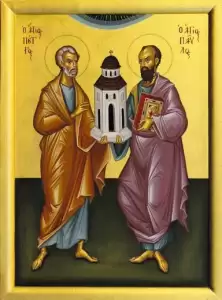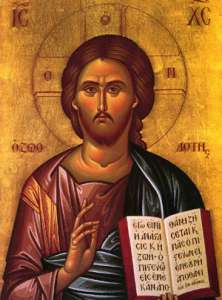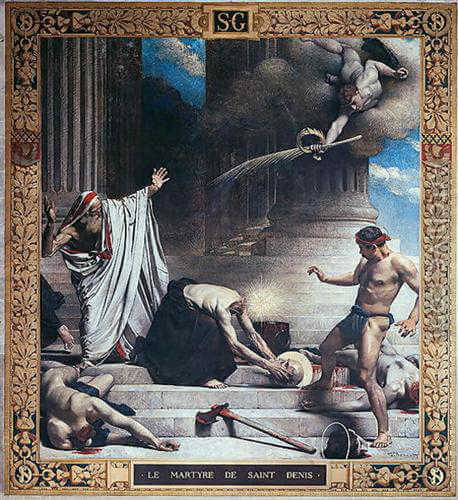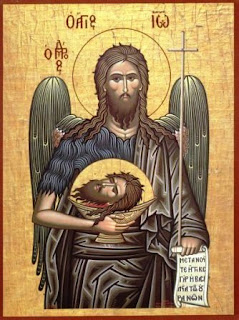When a dear one dies, the unbeliever sees a cadaver, but the Christian sees a body asleep. The unbeliever says the dead person has "gone." We agree, but we remember where he has gone. He has gone where the Apostle Paul is, where Peter is, where the whole company of the saints are. We remember that he will rise, not with tears of dismay, but with splendor and glory.
St. John Chrysostom
October 2022
For Sunday, October 9
Why did Christ touch when he healed?
by Fr. Ninos Oshaana
In every Orthodox funeral service, we read from the Gospel of St. John the words of our Lord telling the Jews: “I say to you, the hour cometh, and now is, when the dead shall hear the voice of the Son of God and they who hear shall live.” (John 5:25). In the gospel reading for this Sunday, we will hear the amazing account of the raising of the young man who was the only son of a widow in the city of Nain. The voice of the Son of God calls the soul of this man back from the dead in an instant. The miracle is both a fulfillment of the words of our Lord at that time but also confirms what he will do at the end of time when all the dead will be raised. It is another revelation that Christ is God and that he has power over life and death.
There are times when Christ performed miracles and healed people simply by a word. Then there are instances such as this event where the miracle is performed both through his words and his touch. This is a detail that St. Luke includes in the gospel reading which has great significance. St. Cyril of Alexandria explains why:
"Christ raised him who was descending to his grave. The manner of his rising is plain to see. “He touched,” it says, “the bier and said, ‘Young man, I say unto thee, arise.’ ” How was not a word enough for raising him who was lying there? What is so difficult to it or past accomplishment? What is more powerful than the Word of God? Why then did he not work the miracle by only a word but also touched the bier? It was, my beloved, that you might learn that the holy body of Christ is productive for the salvation of man. The flesh of the almighty Word is the body of life and was clothed with his might. Consider that iron when brought into contact with fire produces the effects of fire and fulfills its functions. The flesh of Christ also has the power of giving life and annihilates the influence of death and corruption because it is the flesh of the Word, who gives life to all. May our Lord Jesus Christ also touch us that delivering us from evil works, even from fleshly lusts, he may unite us to the assemblies of the saints."
The Church has always taught and believed that the body of Christ is life-giving. Again, from the Orthodox funeral service, the words of the Lord reveal this as well when says, “For as the Father has life in himself he has granted the Son also to have life in himself (John 5:26). And later in that same gospel of St. John, Christ says it even more directly: “Truly, truly, I tell you, unless you eat the flesh and drink the blood of the Son of Man, you have no life in you. Whoever eats My flesh and drinks My blood has eternal life, and I will raise him up at the last day.… (John 6:53).
Christ is the life-giver for us who are slowly dying every day. We are in need of his life-giving voice that we find in the Holy Scriptures. We are in need of his life-giving touch that we experience in Holy Communion. Christ gives the only true life in this fallen and dying world, insofar as we live our lives in repentance, godliness and a manner worthy of Him whom we are receiving. In this way, we truly live and live truly in Christ.
 Epistle Reading
Epistle Reading
The reading is from St. Paul's Second Letter to the Corinthians 6:16-18; 7:1
Brethren, you are the temple of the living God; as God said, "I will live in them and move among them, and I will be their God, and they shall be my people. Therefore come out from them, and be separate from them, says the Lord, and touch nothing unclean; then I will welcome you, and I will be a father to you, and you shall be my sons and daughters, says the Lord Almighty."
Since we have these promises, beloved, let us cleanse ourselves from every defilement of body and spirit, and make holiness perfect in the fear of God.
Do you know who you are?
Know to what extent the Creator has honored you [the human being] above all the rest of creation. The sky is not an image of God, nor is the moon, nor the sun, nor the beauty of the stars, nor anything of what can be seen in creation. You alone have been made the image of the Reality that transcends all understanding, the likeness of imperishable beauty, the imprint of true Divinity, the recipient of beatitude, the seal of the true light. When you turn to Him you become that which He is Himself… There is nothing so great among beings that it can be compared with your greatness. God is able to measure the whole Heaven with His span. The earth and sea are enclosed in the hollow of His hand. And although He is so great and holds all creation in the palm of His hand, you are able to hold Him, He dwells in you and moves within you without constraint, for He has said, ‘I will live and move among them.
- St. Gregory of Nyssa
Questions:
- What makes it difficult to see ourselves in the way that St. Gregory describes?
 Gospel Reading
Gospel Reading
Luke 7:11-16
At that time, Jesus went to a city called Nain, and his disciples and a great crowd went with him. As he drew near to the gate of the city, behold, a man who had died was being carried out, the only son of his mother, and she was a widow; and a large crowd from the city was with her. And when the Lord saw her, he had compassion on her and said to her, "Do not weep." And he came and touched the bier, and the bearers stood still. And he said, "Young man, I say to you, arise." And the dead man sat up, and began to speak. And he gave him to his mother. Fear seized them all; and they glorified God, saying, "A great prophet has arisen among us!" and "God has visited his people!"
The Soul, Mind and Body: A symbolic interpretation of Luke 7:11-16
Because the Lord, while not even present, had healed the centurions servant, He now performs another even more remarkable miracle. He does this so that no one could say, "What is remarkable about the healing of the centurions servant? Perhaps the servant would not have died in any case." This is why the Lord now raises up the dead man as he was being carried out for burial. He does not perform the miracle by His word alone, but also touches the bier, teaching us that His very Body is life. Because God the Word Who gives life to all things Himself became flesh, therefore His flesh itself is likewise life-creating, and takes away death and corruption. The dead man sat up and began to speak, so that some would not think that his rising was only an apparition. Sitting up and speaking are definite proofs of resurrection from the dead. ”How can a lifeless body sit up and speak?
You may also understand the widow to mean the soul which has suffered the loss of its husband, the Word of God which sows the good seed. The son of such a widow is the mind which is dead and is being carried outside the city, that is, outside the heavenly Jerusalem which is the land of the living. The Lord then takes pity and touches the bier. The bier which carries the dead mind is the body. And indeed the body is like a tomb, as the ancient Greeks said, calling the body a burial mound, which means a tomb. Having touched the body, the Lord then raises the mind, restoring its youth and vigor. And after the young man, meaning the mind, has sat up, raised from the tomb of sin, he will begin to speak, that is, to teach others. While he is in the grip of sin, he cannot speak or teach for who would believe him?
- Blessed Theophylact - The Holy Gospel According to St. Luke
Questions:
- St. Theophylact offers both a theological explanation and a metaphorical, symbolic interpretation of this miracle. When the soul is away from God, the mind of such a person is deadened. But God touches the body and causes the mind to rise and encounter Him. Having been forgiven from sin, the person shares his authentic experience of conversion with others. Has something like this happened in your life or someone you know? How did God perform that miracle?

Hieromartyr Denis, Bishop of Paris
In the book History of the Franks, Gregory of Tours writes that under Roman Emperor Decius, there was such a slaughter of Christians that they could not even be counted. At this time, seven men were ordained as bishops and sent to the Gauls (region of modern-day France, Belgium and West Germany) to preach. Among them was Denis, which in French is Dionysios. He was sent to Paris by Pope Fabian. He settled along the Seine River in a house where he built a church in Paris and converted great numbers to the faith. This alarmed the pagan priests, so Denis was arrested and tortured on an iron grill, placed in front of hungry animals, and partially crucified. While on the cross, he preached to the people the Crucified and Risen Christ and salvation through Him. While in prison, Denis served the Liturgy amid a divine light, and Jesus appeared and gave him Holy Communion. Finally, Denis was beheaded with the sword, and it is said that he picked up his head and walked six miles, preaching a sermon the entire way, thus making him one of the many Cephalophores in the writings of the Saints.
The site where St. Denis died was developed into the St. Denis Basilica, which later became the burial place of the kings of France. (Source: Orthodox Lives of the Saints)
 In Orthodox iconography there is a category of icons that depict the martyrs who were beheaded such as the Honorable Forerunner and St. George the Great Martyr. In the icon, the martyr is depicted holding in his hands his severed head as an offering to Christ. These saints are given the title of cephalophores or literally head-bearers. As Christ, in his great love for us, offered his body for crucifixion and death as the sacrificial lamb for our sins, so the martyrs, out of their love for Christ, emulate Christ in offering their bodies and lives to Him.
In Orthodox iconography there is a category of icons that depict the martyrs who were beheaded such as the Honorable Forerunner and St. George the Great Martyr. In the icon, the martyr is depicted holding in his hands his severed head as an offering to Christ. These saints are given the title of cephalophores or literally head-bearers. As Christ, in his great love for us, offered his body for crucifixion and death as the sacrificial lamb for our sins, so the martyrs, out of their love for Christ, emulate Christ in offering their bodies and lives to Him.
The story of St. Denis is stunning in the detail given about what occurred after his beheading. Through the miraculous power of God, St. Denis did not die immediately but picked up his own severed head and began walking and preaching a sermon. Upon first reading this account, our modern-day minds may recoil in disbelief as we ask ourselves "could such a thing really happen"? But we know that with God all things are possible. So the real question to ask first is whether God could perform such a miracle. We know, believe and accept all the other amazing miracles in the Bible, witnessed by hundreds of people such as God speaking through the burning bush to Moses, the parting of the sea by Moses, the manna that fell from heaven, the Virgin birth of Christ, Peter and Christ walking on the water, the raising of the dead by Christ and his own resurrection from the dead and physical ascension into heaven, and all the miracles performed by the saints of the Church. If we believe these events then why would we not believe this one about St. Denis? The moment we think that anything we read in the lives of the Saints is "far-fetched," we allow a demonic seed of doubt to enter our hearts. Because by immediately dismissing something as impossible, we call into question God's power and this is primarily because of our own limited faith which we project onto God! Neither should we ignore our logical reasoning but rather that logic simply doesn't apply when it comes to miracles because they are completely illogical! The only response we can offer is awe and thanksgiving, saying "Glory to thee O God, glory to thee."
Thank you for participating in SOFIA! If you've subscribed to our newsletter, look for an email notification next week when a new lesson page is posted. See you Sunday!

 Weekly catechism and spiritual devotion for the Orthodox home
Weekly catechism and spiritual devotion for the Orthodox home